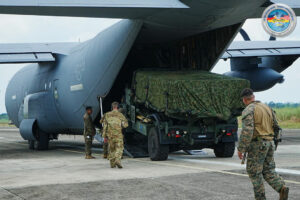THE UNITED STATES eyes integration of anti-cyberthreat technology in its annual Balikatan (shoulder-to-shoulder) war games with the Philippines, an embassy official said on Thursday.
Jennifer Schmidt, Information and Communications Technology (ICT) unit chief of the Economic Section at the US Embassy in Manila, said cyber cooperation is “rapidly moving from an emerging area to a central pillar” of the defense partnership, driven by recognition that future conflicts may begin in the digital domain.
This year’s Balikatan exercises, the Philippine and US militaries’ largest annual drills, included a cyber and defense exercise component for the first time, which is “a huge step forward,” she told a panel discussion in Makati City.
“We’re working alongside our Filipino partners to incorporate cutting edge training ranges and robust cyberthreat software into these exercise scenarios,” she added, noting they are focusing on specialized cyber teams rather than all participating officers.
While declining to provide operational specifics, she said the drills simulate real-world attack environments that allow the Armed Forces of the Philippines’ Cyber Command and US counterparts to practice information-sharing and rapid response.
The objective, she said, is seamless interoperability across military units and national critical infrastructure — ensuring both countries can “respond in real time” should an attack occur.
Washington and Manila are bound by a 74-year-old Mutual Defense Treaty that obliges each side to come into each other’s aid in the event of an armed attack by an external force.
Both countries train together annually to strengthen military alliances, interoperability, and improve readiness for national security. They conducted the iteration this year last April 21 to May 9.
Both countries are now adapting the 2026 iteration of the drills to reflect the reality that cyber capabilities are integral to all military operations.
Manila, Washington’s close ally in the Indo-Pacific, is currently in a diplomatic deadlock with China in the South China Sea.
Beijing has repeatedly harassed Filipino vessels conducting resupply and patrol missions within Manila’s exclusive economic zone, prompting a series of diplomatic protests and heightening concerns over the risk of further escalation.
Washington has repeatedly called for the rule of law in the South China Sea, urging all parties to respect the 2016 arbitral ruling that invalidated China’s expansive maritime claims and to refrain from coercive actions that undermine regional stability. — Chloe Mari A. Hufana

